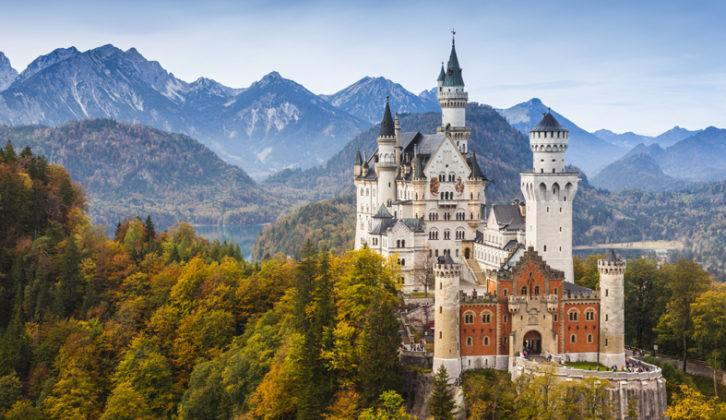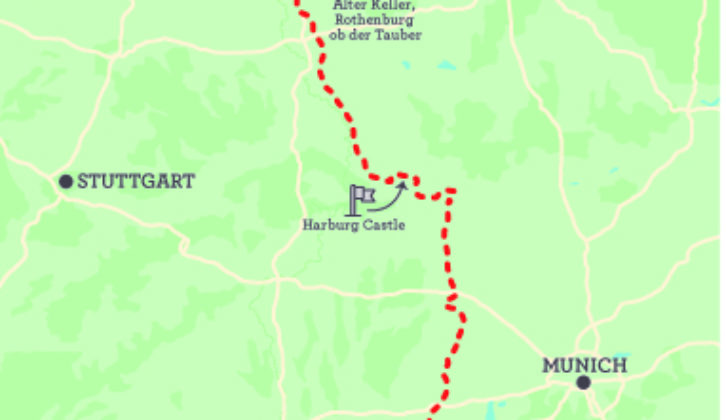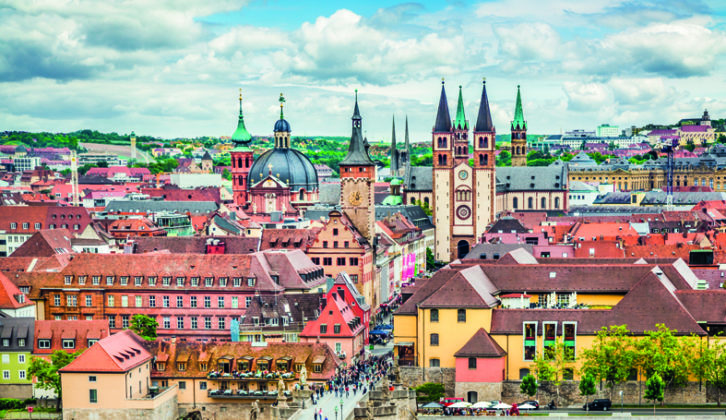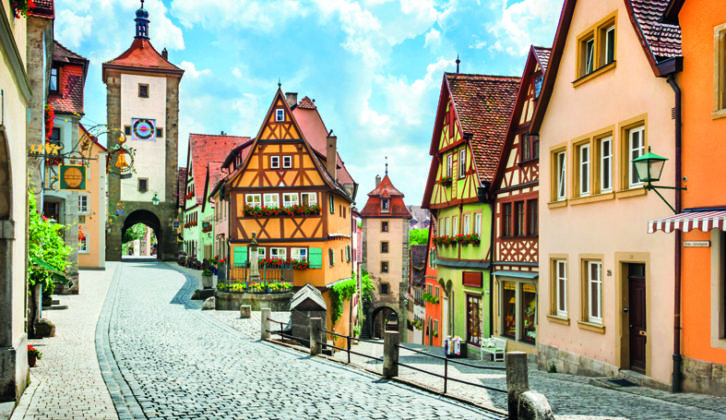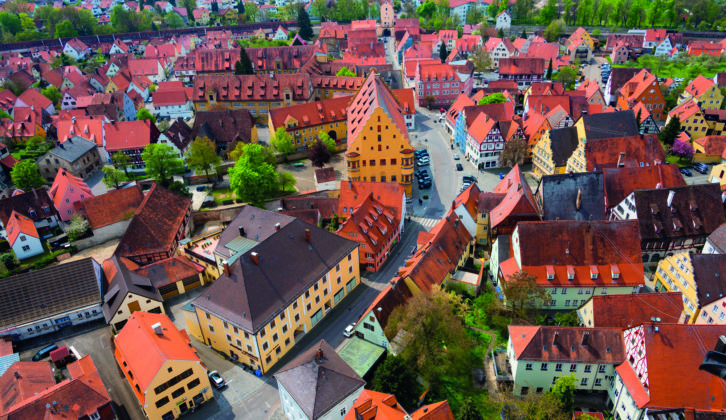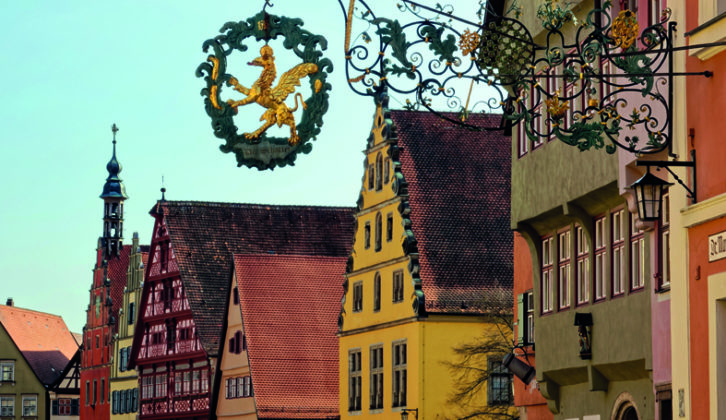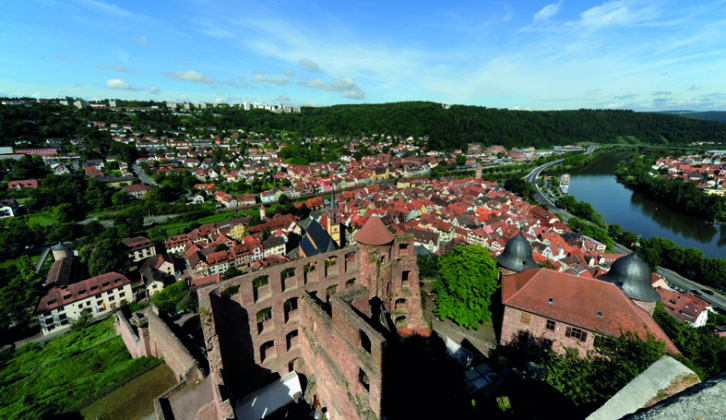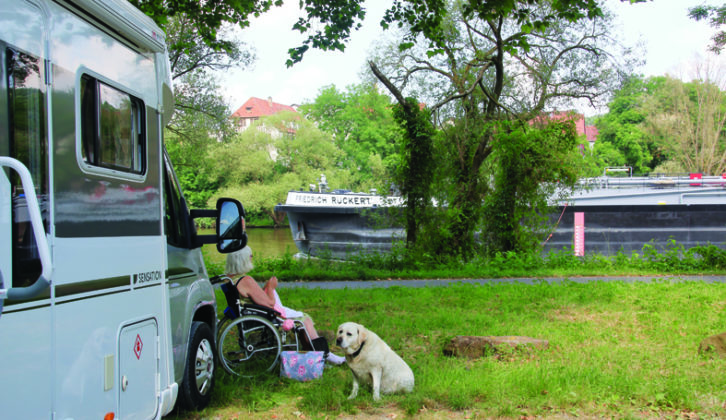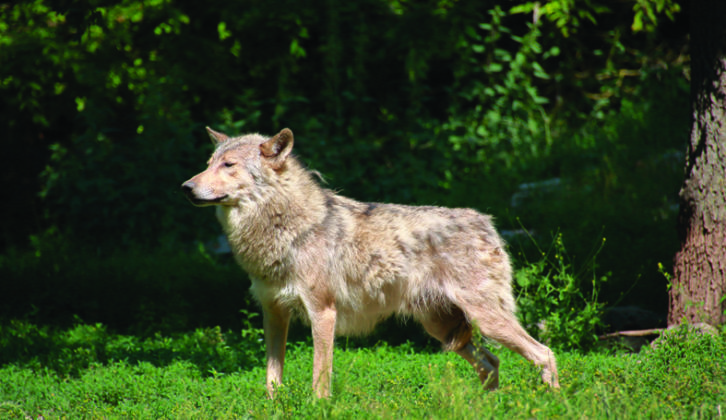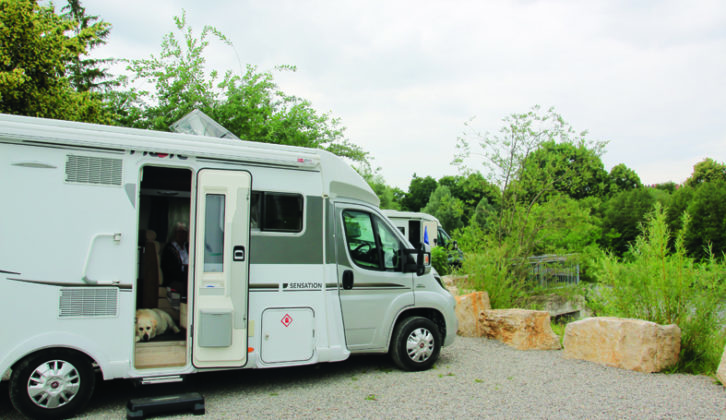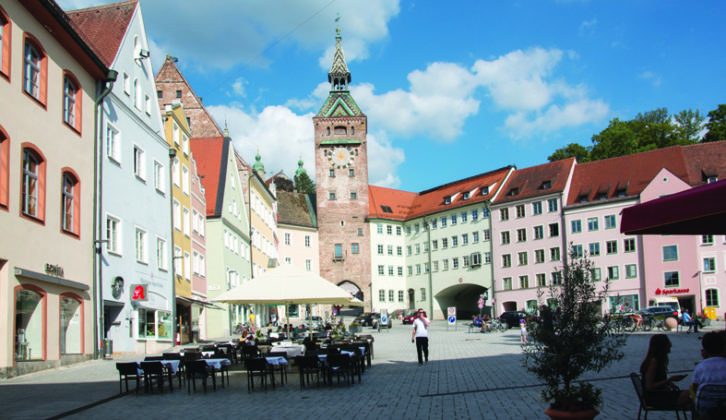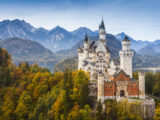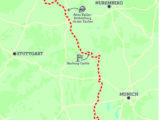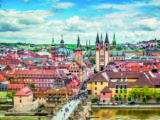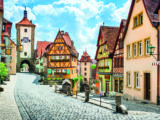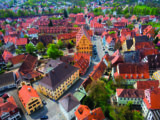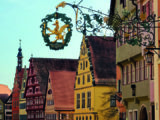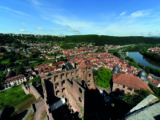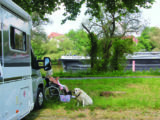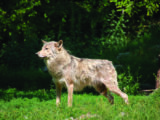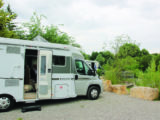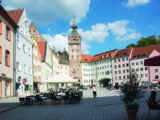Germany’s aptly named Romantic Road (Romantische Straße) starts in the country’s northern regions of Bavaria and Baden-Württemberg. The route takes in picturesque villages, historic medieval towns, beautiful vineyards, and stunning palaces and castles, and ends in dramatic fashion at the foot of the Alps in southern Bavaria.
This was a journey undertaken by Practical Motorhome contributors Peter and Vera Whalley back in the summer of 2018, and we’ve included some of their observations along the route.
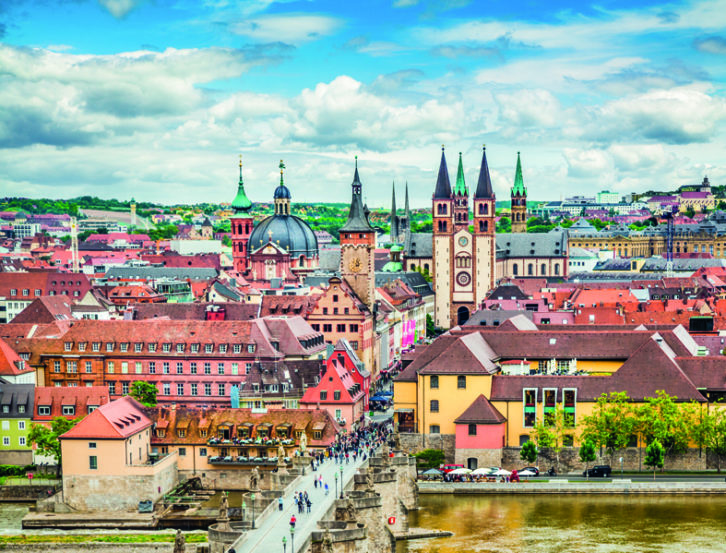
The journey begins in the city of Würzberg. No doubt you’ll be very keen to hit the road, but be sure not to neglect a city that’s worthy of exploration before you get going.
The city’s most famous attraction is the 18th-century Würzberg Residence, a UNESCO World Heritage Site thanks to its incredible Baroque and Neoclassical architecture, painted frescoes and grand halls.
You can choose from three Stellplätze f you are stopping here in the city: there’s Würzberg Stellplatz; just south of the city is the Canoe Club; and there’s another further south, at Eibelstadt – the latter two are on the River Main.
Wine-making country
From Würzberg, you’ll be driving through the Tauber Valley, a wine-making region that’s going to treat you to views of vineyard-covered hills, with castles dotted along the route.
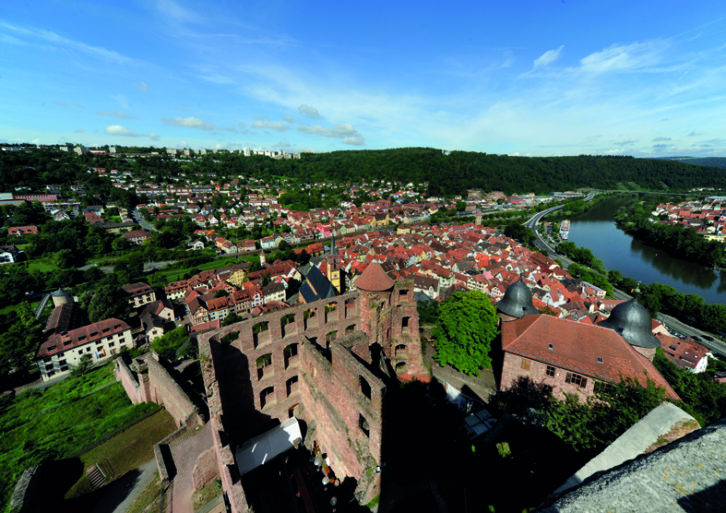
The Romantic Road traditionally heads straight for the village of Tauberbischofsheim, which is 38km (24 miles) to the south-west, but in recent years, it’s become increasingly common to take a short detour to Wertheim am Main. This boasts a historic medieval old town, but the highlight is unquestionably the castle that sits above and offers incredible views of Wertheim, as well as the Main and Tauber rivers.
Where you make your next stop on the trip depends on how long you’ve allocated for your journey. For those taking a shorter trip, the next essential stop on the tour is Rothenburg ob der Tauber. However, there’s plenty to see before you get there, and if you’ve got a few days to spare, there are at least a couple of towns and villages where you’ll want to make a visit.
You’ll be driving through Tauberbischofsheim, Lauda-Königshofen, Bad Mergentheim, Röttingen, Weikersheim and Creglingen. Cruising through Tauberbischofsheim will give you a taste of what’s to come, with traditional wood-framed houses painted in pastel colours lining its medieval market square, and a 13th-century castle and tower at its centre. Stay at the Stellplatz on the banks of the River Tauber and you’re just a few minutes’ walk from the town.
Castles and monasteries
You can take in more fine medieval architecture at Lauda-Königshofen, located on the Tauber River, explore another impressive castle, visit the 15th-century monastery in Bad Mergentheim or see a lavish palace in Weikersheim.
If you’re on a longer trip and plan to take in some of these optional destinations, you could stay at the large Stellplatz at the spa and sports complex in Bad Mergentheim.
Next is one of the trip’s highlights: Rothenburg ob der Tauber. While you can justify a leisurely drive through at least some of the aforementioned spots and simply appreciate them as you go by, this one really does require a stop.
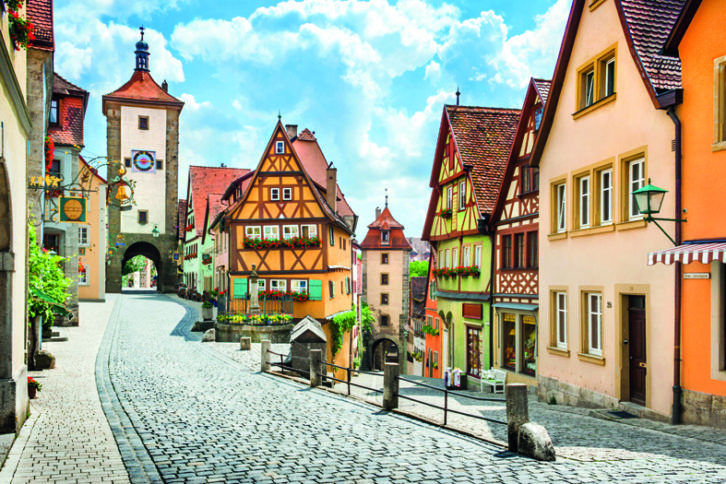
Rothenburg is a stunning town that’s especially famous for its cobbled streets, well-preserved medieval walls and quintessentially traditional German architecture.
Wander the wooden walkways on the city walls, and see battlements, ornate fountains, towers, the stunning St Jakobskirche and more in a town that has something to admire in every direction. Rothenburg gets a lot of visitors, but few spend the night. Stay at Parking 2, a Stellplatz near one of the magnificent gated entrances to the town. Stroll around the streets as they empty out in the evening and experience an atmosphere that’s appropriately romantic.
But don’t feel too bad wrenching yourself away from the beauty of Rothenburg, because there’s plenty more to see as you resume your trip.
If time is a factor for you, you’re going to have some tough choices to make on the next leg of your journey, with Dinkelsbühl, Nördlingen and Harburg all making strong cases as destinations you need to check out. We’ll make those cases here, and it’s up to you which you’ll prioritise. However, if you’ve got plenty of time, why not enjoy all three?
City gates and guard towers
Just northeast of Dinkelsbühl is DCC Camping Park, for an overnight stay. To explore the town, park at the Stellplatz on Mönchsrother Strasse, only a few minutes’ walk from the centre.
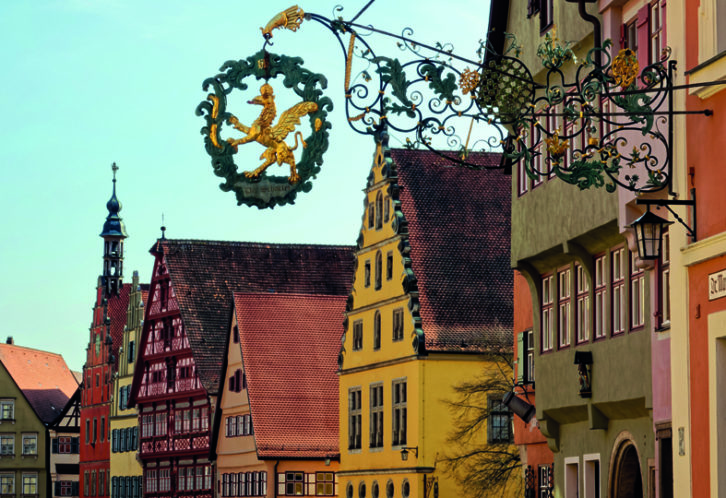
Dinkelsbühl, it could be argued, is a less well-known version of Rothenburg. It is another medieval walled city, with cobbled streets and beautiful timber buildings. Its historic walls house stunning city gates and guard towers.
To visit Nördlingen, you could stop over at the excellent Stellplatz on Innerer Ring. Nördlingen has something unique that sets it apart from the other walled cities on the route.
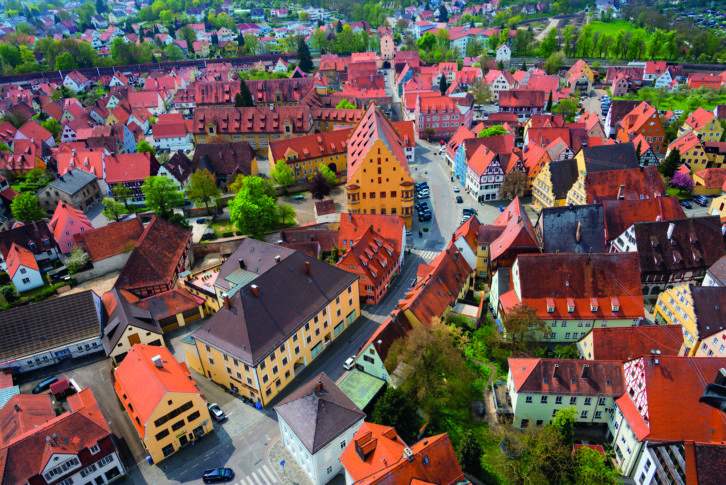
Climb to the top of St Georgskirche to enjoy the great view from its 90m (100ft) bell tower and you’ll also be able to see that the city is set in a distinct ring. This is the result of a meteor impact more than 15 million years ago, creating the crater in which the town was built.
You’ll spot Harburg’s main attraction before you even get there. Perched on hills overlooking the valley you’ll drive through is Harburg Castle, one of the oldest and largest castle complexes in the whole of southern Germany.
It’s true that you’ll be driving past many castles on this route, but they will mostly be in varying degrees of ruin. Harburg Castle, which dates back to the 11th century, stands out because of how remarkably well-preserved it is. You can even park here overnight if you want to make a stop.
Island in the river
Your next destination will be Augsburg, although you might consider a short stop in Dönauworth along the way. Another charming town, which was founded in the 12th century, the special feature here is an island formed by the meeting of the Danube and Wornitz rivers, where you will also find a Stellplatz.
Now it’s on to the ancient city of Augsburg, founded by the Romans in 15 BCE. You won’t be surprised to hear that there’s an abundance of incredible historic architecture to be admired here. Highlights include the town hall, the Perlachturm, a 1000-year-old watchtower, and the Cathedral of St Maria, featuring a fine ninth-century chapel.
Augsburg is an Umweltzone (low-emission zone), so don’t forget to buy your sticker before you go. You can park at the Stellplatz on Bŭrgermeister Ackermann Strasse 1, and then it should take you about 20 minutes to walk to the town centre.
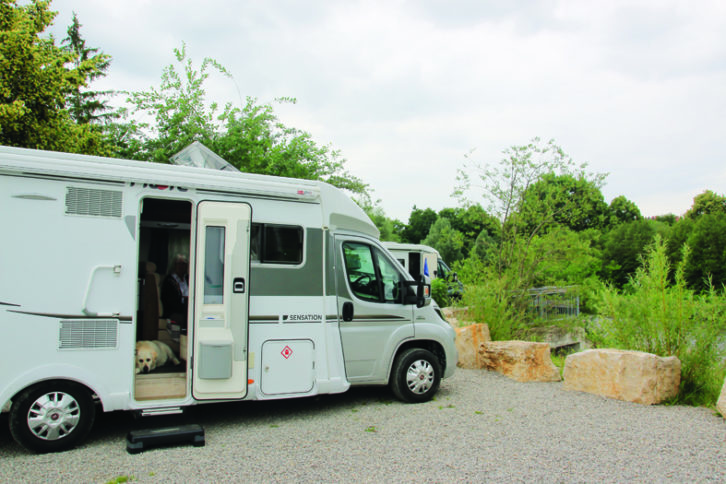
After leaving Augsburg, you’ll be heading through Friedberg, Kaufering, Landsberg am Lech, Hohenfurch and Schongau. These stops should be considered optional; although we’d pick out Landsberg and Schongau as two you might consider, the former offering 13th-century artchitecture and the latter, some pleasant walks through a beautiful hilltop old town.
From here, the character of the Romantic Road will begin to change, as the Alps start to become visible on the horizon. There are some imposing and historically significant religious buildings to take in on this leg of the journey, including Rottenbuch Abbey, Steingaden Abbey and Wieskirche. However, you could be forgiven for simply powering through to experience one of Germany’s most iconic sights.
Fairytale palaces
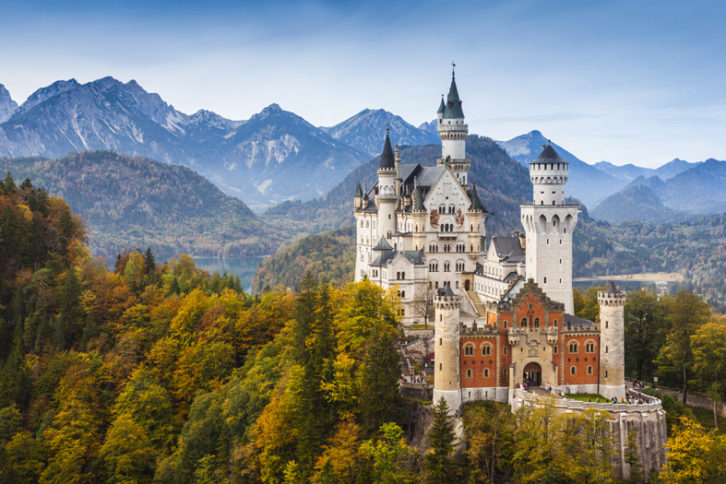
Weaving your way through picture-postcard villages with the Alps soaring into view, you’ll soon reach the inspiration for the famous Disney Castle, the fairytale palace that is Neuschwanstein Castle. Rising from the tree-covered hills above the village of Hohenschwangau, this beautiful Romanesque Revival palace is set against a lake at the foot of the hill and the mountains that peak in the background, creating a setting that’s as beautiful as it is dramatic.
The view itself is a spectacular treat as you drive through, but if you have time, you can go inside and take a look at the palace’s lavish interior decoration and architecture.
Roll straight into the Stellplatz at the final stop on the route, Füssen, just 3.5km (two miles) away, near the border with Austria. This is a good base for visiting the castles, and a 15-minute walk will bring you to the old town, with its 14th-century castle and the Baroque St Mang’s Abbey. Its fine mountain setting, with the kind of charming architecture that defines the Romantic Road, makes this a fitting end to a wonderful journey.
DID YOU KNOW?
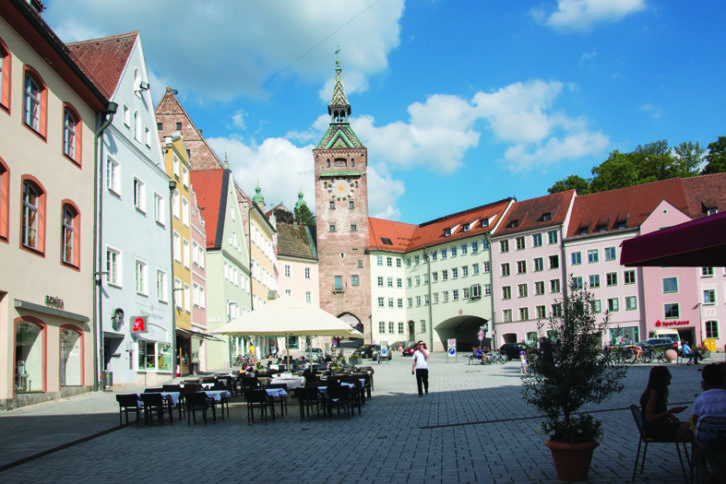
- In March 1945 the RAF destroyed the centre of the city of Würzburg, leaving only seven buildings intact. This was just three weeks before US forces took control of the area. The Americans and locals did such an amazing job of rebuilding the city after the war, that most people would never guess that almost all of Würzburg is relatively modern.
- Landsberg is one of the most attractive towns on the Romantic Road. It was founded by Henry the Lion and heavily fortified with medieval walls and gateways to protect the region’s thriving salt and textile trades.
- Bad Mergentheim has a wildlife park with the largest wolf pack in Europe.
TOUR ESSENTIALS
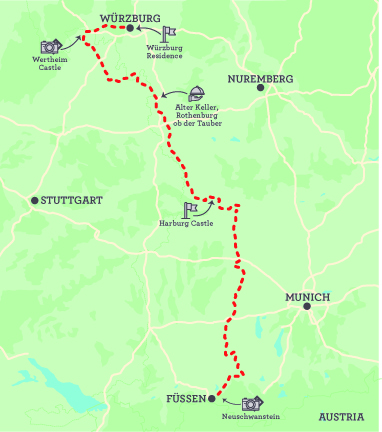
- How many days: three to seven
- When: July to October for better weather conditions
- Distance: 280 miles
WAY TO GO
From the Channel Tunnel, cross Belgium into Germany close to the Moselle, skirt Frankfurt and take the A3/E41 down to Wertheim and then on to Würzburg.
WHERE TO STAY
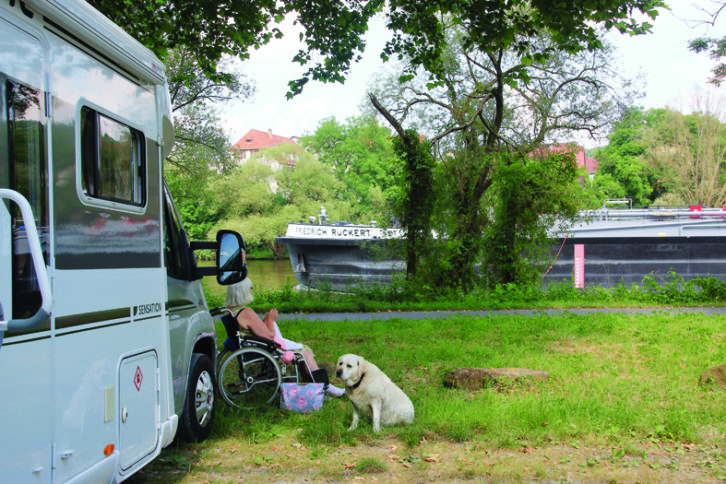
- Campingplatz Kalte Quelle; Winterhäuser Strasse 160, 97084 Würzburg
- Würzburg Stellplatz; Viehmarktplatz, Dreikronenstrasse
- Wassersportclub Eibelstadt eV; Mainparkring, 97246 Eibelstadt
- Wertheim Stellplatz; Wohnmobilstellplatz an der Taubermundung, Linke Tauberstrasse
- Tauberbischofsheim Stellplatz; Vitryallee 7, 97941 Tauberbischofsheim
- Bad Mergentheim Stellplatz; Erlenbachweg, 97980 Bad Mergentheim
- Rothenburg ob der Tauber Stellplatz; Nördlinger Straße 6, 91541, Rothenburg ob der Tauber
- Dinkelsbühl DCC Camping Park; Kobeltsmuhle 6, 91550 Dinkelsbühl
- Dinkelsbühl Stellplatz; Mönchsrother Straße, 91550 Dinkelsbühl
- Nördlingen Stellplatz; Parkplatz Kaiserwiese, Innerer Ring, 86720 Nördlingen
- Augsburg Stellplatz; Bürgermeister Ackermann Straße 1, 86156 Augsburg
- Landsberg am Lech Stellplatz; Gottesackerangerweg 1, 86899 Landsberg am Lech
- Schongau Stellplatz; Lechuferstraße, 86956 Schongau
- Via Claudia Camping; Via Claudia 6, 86983 Lechbruck am See
- Füssen Stellplatz; Abt Hafner Straße 9, 87629 Füssen
FIND OUT MORE
Romantic Road:
If you liked this… READ THESE:
Nördlingen has something unique that sets it apart from the other walled cities you'll see on the route
